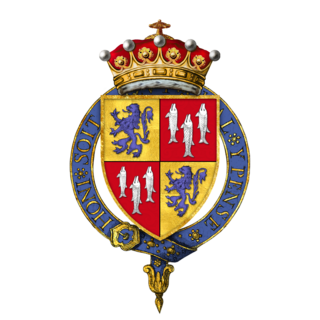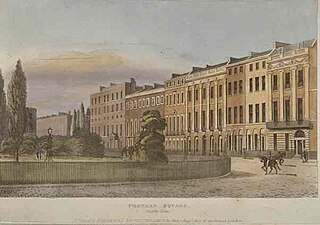This page is based on this
Wikipedia article Text is available under the
CC BY-SA 4.0 license; additional terms may apply.
Images, videos and audio are available under their respective licenses.

Sir Henry Percy KG, commonly known as Sir Harry Hotspur, or simply Hotspur, was a late-medieval English nobleman. He was a significant captain during the Anglo-Scottish wars. He later led successive rebellions against Henry IV of England and was slain at the Battle of Shrewsbury in 1403 at the height of his career.

The Golden Treasury of English Songs and Lyrics is a popular anthology of English poetry, originally selected for publication by Francis Turner Palgrave in 1861. It was considerably revised, with input from Tennyson, about three decades later. Palgrave excluded all poems by poets then still alive.

Duke of Northumberland is a noble title that has been created three times in English and British history, twice in the Peerage of England and once in the Peerage of Great Britain. The current holder of this title is Ralph Percy, 12th Duke of Northumberland.

Events from the year 1908 in Canada.
The title of Earl of Northumberland was created several times in the Peerage of England and of Great Britain, succeeding the title Earl of Northumbria. Its most famous holders were the House of Percy, who were the most powerful noble family in Northern England for much of the Middle Ages. The heirs of the Percys, via a female line, were ultimately made Duke of Northumberland in 1766.

Henry Percy, 4th Earl of Northumberland KG was an English aristocrat during the Wars of the Roses. After losing his title when his father was killed fighting the Yorkists, he later regained his position. He led the rear guard of Richard III's army at the Battle of Bosworth, but failed to commit his troops. He was briefly imprisoned by Henry VII, but later restored to his position. A few years later he was murdered by citizens of York during a revolt against Henry VII's taxation.
The Oxford Book of English Verse, 1250–1900 is an anthology of English poetry, edited by Arthur Quiller-Couch, that had a very substantial influence on popular taste and perception of poetry for at least a generation. It was published by Oxford University Press in 1900; in its india-paper form it was carried widely around the British Empire and in war as a 'knapsack book'. It sold close to 500,000 copies in its first edition. In 1939, the editor revised it, deleting several poems that he regretted including and adding instead many poems published before 1901 as well as poems published up to 1918. The second edition is now available online.

Blessed Thomas Percy, 7th Earl of Northumberland, 1st Baron Percy, KG, led the Rising of the North and was executed for treason. He was later beatified by the Catholic Church.

The House of Percy is an English noble family. They were one of the most powerful noble families in northern England for much of the Middle Ages, known for their long rivalry with another powerful northern English family, the House of Neville.

The Lord Warden of the Marches was an office in the governments of Scotland and England. The holders were responsible for the security of the border between the two nations, and often took part in military action. They were also responsible, along with 'Conservators of the truce', for administering the special type of border law known as March law.
This is a list of people who have served as Lord-Lieutenant of Northumberland. Since 1802, all Lords Lieutenant have also been Custos Rotulorum of Northumberland.

Portman Square is a square in the City of Westminster, London, and part of the Portman Estate. It is located at the western end of Wigmore Street, which connects it to Cavendish Square to its east.
The Treaty of Uxbridge of early 1645 was a significant but abortive negotiation to try to end the First English Civil War.
Honouring individuals with burials and memorials in Westminster Abbey has a long tradition.
The 1869 Birthday Honours were appointments by Queen Victoria to various orders and honours to reward and highlight good works by citizens of the British Empire. The appointments were made to celebrate the official birthday of the Queen, and were published in The London Gazette on 2 June, 4 June and 1 July 1869.
The 1873 Birthday Honours were appointments by Queen Victoria to various orders and honours to reward and highlight good works by citizens of the British Empire. The appointments were made to celebrate the official birthday of the Queen, and were published in The London Gazette on 24 May 1873.








